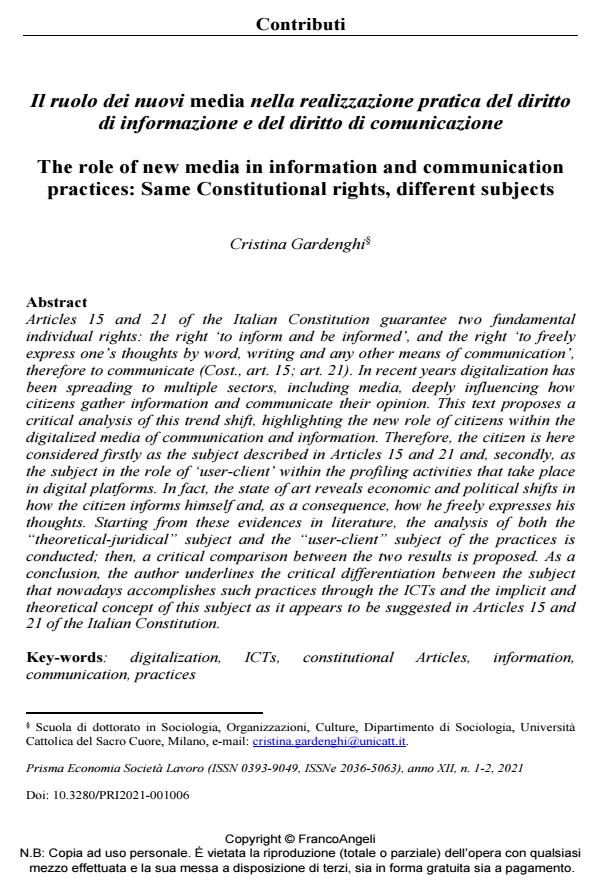The role of new media in information and communication practices: Same Constitutional rights, different subjects
Journal title PRISMA Economia - Società - Lavoro
Author/s Cristina Gardenghi
Publishing Year 2023 Issue 2021/1-2
Language Italian Pages 17 P. 82-98 File size 262 KB
DOI 10.3280/PRI2021-001006
DOI is like a bar code for intellectual property: to have more infomation
click here
Below, you can see the article first page
If you want to buy this article in PDF format, you can do it, following the instructions to buy download credits

FrancoAngeli is member of Publishers International Linking Association, Inc (PILA), a not-for-profit association which run the CrossRef service enabling links to and from online scholarly content.
Articles 15 and 21 of the Italian Constitution guarantee two fundamental individual rights: the right ‘to inform and be informed’, and the right ‘to freely express one’s thoughts by word, writing and any other means of communication’, therefore to communicate (Cost., art. 15; art. 21). In recent years digitalization has been spreading to multiple sectors, including media, deeply influencing how citizens gather information and communicate their opinion. This text proposes a critical analysis of this trend shift, highlighting the new role of citizens within the digitalized media of communication and information. Therefore, the citizen is here considered firstly as the subject described in Articles 15 and 21 and, secondly, as the subject in the role of ‘user-client’ within the profiling activities that take place in digital platforms. In fact, the state of art reveals economic and political shifts in how the citizen informs himself and, as a consequence, how he freely expresses his thoughts. Starting from these evidences in literature, the analysis of both the "theoretical-juridical" subject and the "user-client" subject of the practices is conducted; then, a critical comparison between the two results is proposed. As a conclusion, the author underlines the critical differentiation between the subject that nowadays accomplishes such practices through the ICTs and the implicit and theoretical concept of this subject as it appears to be suggested in Articles 15 and 21 of the Italian Constitution.
Keywords: digitalization, ICTs, constitutional Articles, information, communication, practices
- Chomsky N. (2008) Capire il potere, a cura di P. R. Mitchell, J. Schoeffel, Il Saggiatore: Milano.
- Chomsky N., Herman E. S. (2014) La fabbrica del consenso. La politica e i mass media, Il Saggiatore: Milano.
- Foucault M. (2004), L’ordine del discorso e altri interventi, Trad. it. a c. di Fontana A., Bertani M., Zini V., Contributi di Vuillemin J., Postfazione a c. di Bertani M., Einaudi: Torino.
- Foucault M. (2014) Sorvegliare e punire. Nascita della prigione, Trad. it. a c. di Tarchetti A., Einaudi: Torino.
- Gambino A.M., Stazi A., Mula D. (2019) Manuale di Diritto dell’Informatica e della Comunicazione, Giappichelli: Torino.
- Stiegler B. (2014), Il chiaroscuro della rete, a c. di P. Vignola, Kainos: Lecce.
Cristina Gardenghi, Il ruolo dei nuovi media nella realizzazione pratica del diritto di informazione e del diritto di comunicazione in "PRISMA Economia - Società - Lavoro" 1-2/2021, pp 82-98, DOI: 10.3280/PRI2021-001006